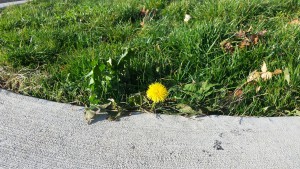Warm Air, Cool Soil
Winter Damage
Winter Damage
Annual Bluegrass Seedhead Suppression
In weed management on golf courses, annual bluegrass (Poa annua) seedhead (inflorescence) suppression often kicks off the growing season. Plant growth regulators can be used to suppress seedhead production if applications are properly timed. Much like pre-emergence herbicides that are not effective if applied after weed emergence, PGRs are less effective if applied too late. […]
Licensing for Mosquito Control – Category 8B
Killing Freezes… Finally
Many people are pleased that typical winter temperatures have taken so long to show up. Below are some interesting observations from early- to mid-winter in New Brunswick. Relatively warm soil temperatures (as high as mid-60s °F) stimulated growth late into December.
 Dandelion bloom on 15 December 2015 in New Brunswick.
Dandelion bloom on 15 December 2015 in New Brunswick.
